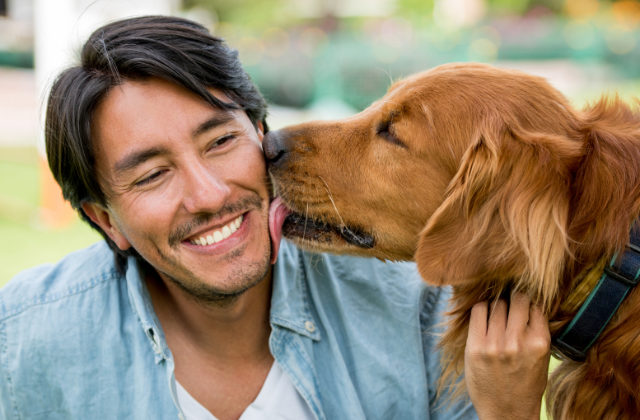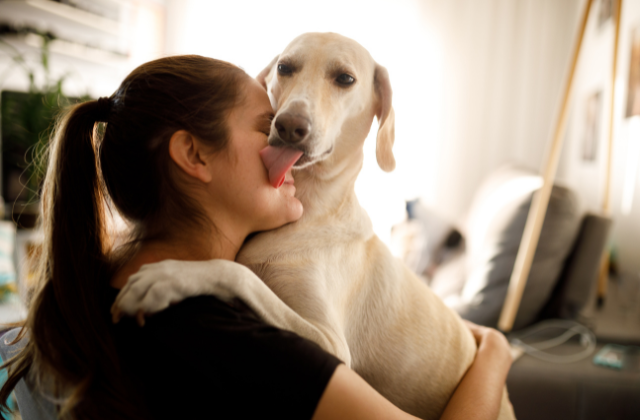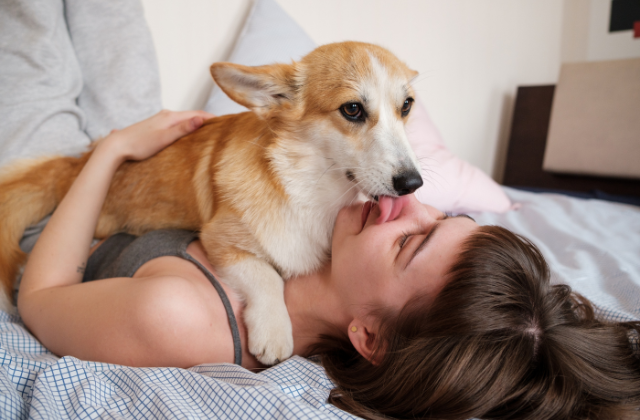As a dog owner, you may have noticed that your furry friend likes to give you slobbery kisses time and time again. But, have you ever wondered why do dogs lick you? Well, there are many reasons behind this behavior, and understanding it can give you insight into your dog’s emotional state and bond with you.
In this section, we will delve into the true meaning behind dog licking behavior and explore the reasons why dogs lick humans. By decoding their behavior, you’ll develop a deeper understanding of your dog’s affectionate nature and strengthen your relationship with them.
Key Takeaways:
- Dog licking behavior is a common and natural behavior among dogs.
- There are several reasons why dogs lick humans, including social communication, chemical signaling, and affection.
- Understanding the psychology behind dog licking can help you interpret your dog’s emotions and social hierarchy.
- Dog licking is a sign of trust and affection between a dog and its owner.
- By understanding why dogs lick you, you’ll develop a deeper connection with your furry friend and appreciate their unique ways of expressing love.
Reasons Why Dogs Lick Humans
There are several reasons why dogs lick humans, and it’s crucial to understand the underlying causes of this behavior. Let’s explore some of the common reasons behind dog licking behavior:
| Reasons | Description |
|---|---|
| Instinctual Behavior | Dogs have an instinct to lick their mothers’ faces to stimulate milk production, and they carry this behavior into adulthood as a way to show affection and seek attention. |
| Communication | Dogs use licking as a way to communicate with their owners, expressing their needs, and desires. |
| Chemical Signaling | Dogs have glands in their mouths that release pheromones, which can transmit a variety of messages to other dogs and humans. |
These are just some of the reasons why dogs lick humans. It’s vital to remember that every dog is unique and may have their own individual motivation for licking. Pay attention to your dog’s body language and behavior to gain a deeper understanding of why they’re licking you.

Observing your dog’s body language is key to understanding their motivation for licking. For instance, if your dog licks you when you come home, it may be because they missed you and are expressing their excitement. Alternatively, if your dog seems anxious or stressed and licks excessively, it may be a sign of an underlying medical condition or behavioral issue.
It’s important to note that excessive licking can be a problem for dogs. If your dog is licking themselves obsessively or is constantly licking you, it may be a sign of an issue that requires veterinary attention.
Summary
Dog licking behavior has various underlying reasons, including instinctual behavior, communication, and chemical signaling. By paying attention to your dog’s body language and behavior, you can gain insight into their motivation for licking. However, if your dog’s licking behavior seems excessive, it’s vital to seek veterinary attention to address any underlying issues.
Interpreting Dog Licks: The Psychology Behind It
As a dog owner, you may have often wondered what your furry friend is trying to communicate when they lick you. While it’s easy to assume that it’s a sign of affection, there’s more to it than just that. In this section, we will explore the psychology behind dog licking and decode what your dog is trying to tell you.
Firstly, it’s important to note that dogs lick for various reasons, including as a social signal, a sign of submission, or even as a way of gathering information. However, when it comes to licking their owners, it’s primarily a sign of affection, trust, and a way of bonding with their human companions.
One of the reasons why dogs lick humans is that it releases endorphins, which gives them a sense of pleasure and comfort. Additionally, dogs are pack animals and have a strong need for social connection and bonding. Licking is a way for dogs to show their affection and reinforce their bond with their owners.
Another aspect of the psychology behind dog licking is the fact that it’s a form of communication. Dogs use their body language to convey their emotions and intentions, and licking is just one way they do so. For example, if your dog licks you while you’re feeling sad or upset, they may be trying to comfort you and show their support.
It’s also worth noting that the position of the lick is important. If your dog licks your face, it could be a sign of dominance or an attempt to assert their rank over you. On the other hand, if your dog licks your hand or feet, it’s more likely a sign of submission and a way of showing respect.
Finally, the frequency of licking is also significant. If your dog licks you excessively or compulsively, it could be a sign of anxiety, stress, or even a medical condition. In such cases, it’s essential to observe your dog’s behavior and consult with a veterinarian if needed.
To sum up, interpreting dog licks involves understanding the context, the position, and the frequency of the behavior. By doing so, you’ll be able to decode what your dog is trying to tell you and strengthen your bond with them. Remember, every lick is a sign of your dog’s affection and devotion to you.
The Benefits of Dog Licking: Sign of Trust and Affection
As a dog owner, you may wonder why your furry friend licks you all the time. Well, there are several benefits associated with dog licking, and recognizing them can help deepen your bond with your pet.
First and foremost, dog licking is a sign of trust. By allowing your dog to lick your face or hands, you are showing them that you trust them, and they in turn are displaying their trust in you. This mutual trust can strengthen the bond between you and your dog, resulting in a happier and more fulfilling relationship.
Another benefit of dog licking is that it is a way for your furry friend to show their affection. When dogs lick their owners, it releases endorphins, also known as the “feel-good” hormones. These hormones not only make your dog feel better, but they also make you feel happier and more relaxed as well. Furthermore, dog licking can be a way for your pet to communicate their emotions, especially when they are feeling anxious or stressed.
Additionally, dog licking is a way for your pet to reinforce their position in the social hierarchy. In the wild, dominant dogs will often lick the faces of subordinate dogs as a way to assert their dominance. When your dog licks you, it can be a way for them to reinforce their status as a beloved member of your family.
Finally, dog licking can also have physical health benefits. According to a study published in the Journal of the American Veterinary Medical Association, dog saliva contains enzymes that can help promote wound healing and fight off infection. So, the next time your dog gives you a clean lick, know that they are not only showing you affection, but also potentially helping you heal!

“A dog is the only thing on earth that loves you more than he loves himself.” – Josh Billings
Conclusion
By now, you have gained a better understanding of the behavior of dog licking and how it relates to their affectionate nature. Interpreting your dog’s licks is key to strengthening your bond and developing a deeper appreciation for their unique way of communicating with you.
Dog Licking and Body Language
Remember, dog licking is not the only way your furry friend communicates with you. Understanding their body language is also essential to interpreting their behavior. Pay attention to cues such as tail wagging, ear position, and vocalizations to gain a more comprehensive understanding of your dog’s thoughts and emotions.
Understanding Dog Licking Behavior
It is important to recognize that dog licking behavior is influenced by many factors, including their instincts, socialization, and emotions. By understanding the reasons why dogs lick humans, you can gain insight into your dog’s motivations and respond accordingly to nurture their well-being and strengthen your bond.
Remember, interpreting your dog’s licks and understanding their behavior is a continuous process that requires patience, observation, and care. By paying attention to the signals your dog is sending you through their licks and body language, you can develop a stronger relationship with your furry friend that is built on trust, affection, and mutual understanding.
FAQ
Why do dogs lick humans?
Dogs lick humans for various reasons, including showing affection, exploring their environment, seeking attention, and grooming themselves or their owners. It’s a natural behavior that is deeply ingrained in their instincts and social communication.
Is dog licking a sign of love?
Yes, dog licking is often a sign of love and affection. Dogs use licking as a way to bond with their owners and show their trust and devotion. It releases feel-good hormones for both the dog and the person being licked, creating a positive and loving connection.
How can I stop my dog from licking me excessively?
Excessive licking can be a sign of anxiety, stress, or certain medical conditions. It’s important to determine the underlying cause and address it accordingly. Consulting with a veterinarian or a professional dog trainer can help you identify the reason behind the behavior and provide guidance on how to modify or redirect it.
What should I do if my dog’s licking becomes bothersome?
If your dog’s licking becomes bothersome or uncomfortable, you can establish boundaries by redirecting their behavior. Offer them an alternative activity, such as a chew toy or puzzle toy, to keep them occupied. Alternatively, you can gently remove yourself from the situation or use positive reinforcement techniques to reward them when they engage in more desirable behaviors.
Are there any health risks associated with dog licking?
While dog licking is generally safe, there are a few health risks to be aware of. Dogs’ mouths can harbor bacteria, and excessive licking can lead to skin irritation or infection in some cases. It’s important to maintain good hygiene for both you and your dog, regularly clean any areas that receive excessive licking, and consult with a veterinarian if you have concerns about your dog’s health.
